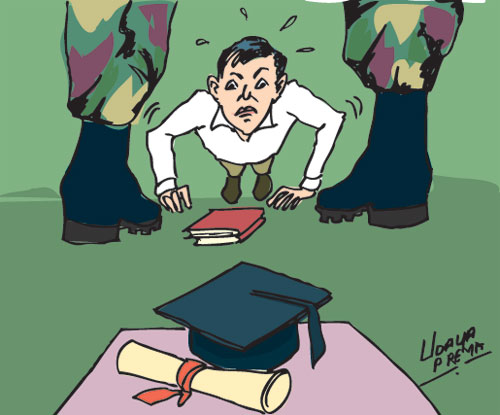 |
Sri Lanka on Monday began compulsory military-led training for thousands of university entrants, despite a Supreme Court stay, and protests by opposition-backed student unions that called it the government’s latest move to militarise the country.
See reports by Reuters and AFP.
President Mahinda Rajapaksa’s government has ordered 22,000 university entrants to attend what it calls “leadership and positive-thinking training” for three weeks at 28 military camps islandwide.
(See our earlier post here on Sri Lanka's mono-ethnic military.)
The first 12,000 began on Monday, despite Sri Lanka's Supreme Court suspending the government order until it makes a ruling on a legal challenge to the scheme.
"We commenced these theoretical and practical training courses to develop leadership ability and positive attitudes," Higher Education Minister S.B. Dissanayake told Reuters.
"This is another step of this dictatorial government’s agenda of militarising society," the head of Inter University Students Federation (IUSF), Sanjeewa Bandara, said.
"They are trying to terrify and suppress students by conducting the training forcibly in military camps so they can have a loyal group of students to fulfil their political agendas," he said.
Dr. Mahim Mendis, a senior lecturer in Social Science told the Sunday Times:
“We expect university students to be free thinkers and not carry any militarized attitudes or attributes. Even in Western countries not all students are subjected to such training. It should be the personal choice of the individual.”
Cartoon Sunday Times
We need your support
Sri Lanka is one of the most dangerous places in the world to be a journalist. Tamil journalists are particularly at threat, with at least 41 media workers known to have been killed by the Sri Lankan state or its paramilitaries during and after the armed conflict.
Despite the risks, our team on the ground remain committed to providing detailed and accurate reporting of developments in the Tamil homeland, across the island and around the world, as well as providing expert analysis and insight from the Tamil point of view
We need your support in keeping our journalism going. Support our work today.
For more ways to donate visit https://donate.tamilguardian.com.

